Awareness Webinar on Climate Fit–Introduction to Sustainability Metrics(ESG) for the Textile Industry–4th May 2023 in association with Futurescape
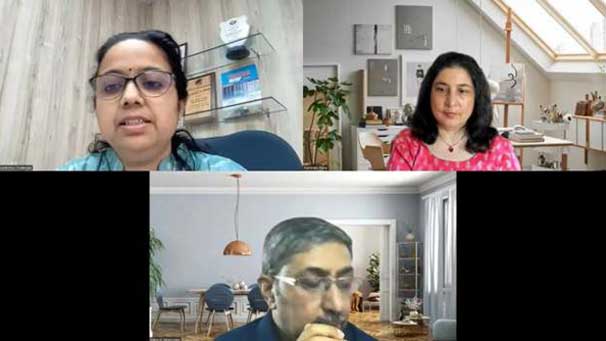
Confederation of Indian Textile Industry (CITI) organised an awareness webinar on Climate Fit – an introduction to sustainability metrics (ESG) for the textile sector. To help the textile sector better understand these requirements, CITI will be organising a series of awareness workshops in the coming days. The first in the series was organised today with ESG experts, Ms. Namrata Rana, Director, Strategies & Brand, Futurescape and Professor Utkarsh Majmudar, Member, Board of Directors, IIM Raipur.
Ms. Chandrima Chatterjee, Secretary General, CITI in her opening remarks stated that the Indian textile industry which is one of the largest contributors to the economy and the second-largest employment provider to the youths must align itself with ESG principles for the socio-economic growth of the country.
She further stated that the Indian textile sector needs to keep pace with the global concerns on ESG issues, given it contributes significantly to the environmental pollution, withsignificant carbon emissions, water consumption, and chemical usage. Byadopting ESG principles, textile companies can not only substantially reduce the environmentalimpact by reducing waste, minimizing resource consumption, and usingsustainable materials but also effectively take care of the labour issues and human rights.
She pointed out that today, consumers have become increasingly conscious about sustainabilityand ethical issues and support companies that demonstrateresponsible and sustainable practices in products making. Hence, adopting ESG norms, textilecompanies can improve their brand reputation and appeal to a growing market ofenvironmentallyandsociallyconsciousconsumers across the globe.
Ms. Namrata Rana, Director (Strategy & Brand) at Futurescape in her presentation stated that the fashion and textile business worldwide was rapidly transforming and sustainability issues were taking centre stage and impacting trends, manufacturing and consumption. She further stated that what worked in the past may not necessarily work in the future, hence, there was a growing need for the companies to change their business strategies and adopt more sustainable business model which efficiently take cares of environmental, social and governance aspects of the business.
She stated that the Indian companies should align its goal with the Prime Minister’s statement that “”By 2030 India will increase the share of renewable energy in total energy to 50% and Net Zero Emission by 2070” which was announced at the COP26 – UN Climate Change Conference in Glasgow. To achieve the PM’s vision, she stated that 58% of top companies in 2022 reported to aspire to be either carbon neutral or achieve net zero. She further revealed that 80% of India’s top 100 companies had shared their decarbonization plans in 2022 and elaborated on the ways how can Indian companies adopt to the climate change.
Prof. Utkarsh Majmudar centred his presentation around understanding sustainability metrics. He elaborated in detail about the 7 Modules of Climate Fit which entailed step-by-step guide to help companies to reduce emissions across their businesses which were 1) Climate Strategy & Governance, 2) Climate Action for Operations, 3) Reducing Emissions in Supply Chain, 4) Design for Net Zero, 5) Financing Net Zero Transition, 6) Engaging People & Communities, and 7) Net Zero Storytelling.
He described that Net Zero refers to achieving an overall balance between emissions produced and emissions taken out of the atmosphere. He further elaborated on Carbon Markets, Carbon Tax, Scope Emissions and the seven steps to execute a great energy efficiency strategy that can help the companies to achieve their sustainability goals.
In their concluding remarks, the Secretary General stated that at the moment, ESG considerations are not mandatory for the companies operating in the textile and apparel domain, however, it is widely being recognized as a key factor in the industry’s long-term sustainability and success in the international market. The companies that have adopted ESG practices are better positioned to meet the changing demands of consumers, investors, and other stakeholders, and to thrive in a rapidly evolving business landscape. Hence, more and more companies should set their sustainability targets to have better visibility in the international market.
2. A day-long workshop on ESG in Textiles: An Indo-Danish perspective
Confederation of Indian Textile Industry (CITI) in collaboration with Innovation Centre Denmark organizes on 23rd May,2023.
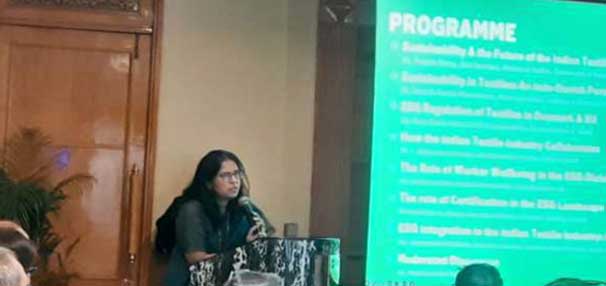 Ms. Prajakta Verma Joint Secretary, Ministry of Textiles addressing ESG Seminar in New Delhi
Ms. Prajakta Verma Joint Secretary, Ministry of Textiles addressing ESG Seminar in New Delhi
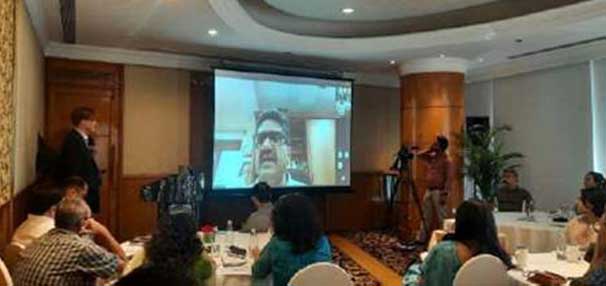 Shri T Rajkumar, Chairman, Confederation of Indian Textile Industry addressing ESG Seminar in New Delhi
Shri T Rajkumar, Chairman, Confederation of Indian Textile Industry addressing ESG Seminar in New Delhi
Confederation of Indian Textile Industry (CITI) in collaboration with Innovation Centre Denmark, Confederation of Danish Industries India office and the lifestyle and design cluster Denmark organized a day-long workshop on barriers to sustainable sourcing and Environmental Social Governance (ESG) in New Delhi on May 23, 2023.
Confederation of Indian Textile Industry (CITI) in collaboration with Innovation Centre Denmark, Confederation of Danish Industries India office and the lifestyle and design cluster Denmark organized a day long workshop on barriers to sustainable sourcing and Environmental Social Governance (ESG) in New Delhi today.
Ms. Prajakta Verma Joint Secretary, Ministry of Textiles, Mr. Soren N Kannik – Marquardsen, Minister Counselleor, Embassy of Denmark, Ms. Marie Busck, Head of CSR & Sustainability, Danish Fashion & Textiles, Shri T Rajkumar, Chairman Confederation of Indian textile Industry, Dr. S Karthieyan, Deputy Executive Director, CII, Ms. Eshika Gombar, Head of Partnerships, Good Business Lab, Ms. Chandrima Chatterjee, Secretary General, Confederation of Indian Textile Industry were the distinguished panelists at the ESG awareness session.
Mr. Soren N Kannik – Marquardsen, Minister Counselor, Embassy of Denmark delivered the welcome address for the session and discussed the Green Strategic Partnership and its relevance to textile.
Ms. Marie Busck, Head of CSR & Sustainability, Danish Fashion & Textiles delivered a detailed presentation on the Future legislations impacting the textile and Fashion Industry like the EU textile strategy launched in 2022 where it is mandated that by 2030 all textile products in the EU would be free from Hazardous chemicals, durable, recyclable, and to a large extent be made from recycled fibres. She also hinted at many other important legislations that would have an impact on the textile and fashion industry worldwide.
Ms. Prajakta Verma – Joint Secretary, Ministry of Textiles highlighted various initiatives the Ministry of Textiles took on the sustainability and circular economy. She highlighted the projects like Lifestyle for Environment (Life)campaign, Kasturi Cotton, Quality Control Order (QCO), SURE Alliance etc in detail along with the impact that these initiatives had on the consciousness of the consumers.
Shri T Rajkumar, Chairman, Confederation of Indian Textile Industry said that this workshop is aimed at understanding the Rationale and Requirement of having good practices in the Green Textile space which is important for long-term compliance to such requirements.
He remarked that the world today is producing and consuming more textiles than ever before and the current very low reuse and recycling rates mean that more textiles are also being thrown away than ever before. which has become an area of growing concern and recognition that there is a need of having some Environmental, Social, and Governance Commitments in the Textile Industry. This is also becoming a key priority for most of the business stakeholders of the world. ESG not only enhances the bottom line of businesses but also helps the textile industry build a great societal impact. He also said that Various global initiatives like the upcoming EU legislation, initiatives for developing Best Available Technology (BAT) which is a reference document in line with the EU BAT, UNIDO initiatives on Green Technology, highlight the growing relevance of steering technological innovation in this area. He concluded by saying that this is the right time for the Government and the Industry to evaluate our Sustainability systems and put in collaborative efforts for the capacity building and technological developments of the industry and CITI is committed to promoting ESG in Textile manufacturing open for collaboration with different associations across the globe for the transfer of existing Best practices.
Dr. S Karthieyan, Deputy Executive Director, CII delivered a detailed presentation on ‘GreenPro’ – An Indian Ecolabel in ESG Landscape. He stated that ‘GreenPro’ is an Indian Eco label that assesses How green is a product based on ‘Lifecycle’ approach on par with international standards. It also guides the manufacturers position their products as ‘Green’ and highlighted the way forward for achieving excellence in environmental performance. He also deliberated on the benefits of the Green Pro label for manufacturers as well as End Users. He concluded his presentation with the importance of reducing the carbon footprint where a holistic approach is needed. ‘GreenPro’ Ecolabel is a new initiative in India that facilitates Indian companies to further move forward and demonstrate their leadership in the ESG front.
Ms. Eshika Gombar, Head of Partnerships, Good Business Lab shared some results of the study done by Global Business Lab on the garment workers in India.
Ms. Namrata Rana, Futurescape talked on the state of preparedness of the industry for the Net Zero and the challenges before them in meeting it.
Ms. Chandrima Chatterjee, Secretary General, Confederation of Indian Textile Industry deliberated on the 6 priority areas for sustainability for the Indian textile sector. She elaborated on each priority area – Materials & Traceability, Climate, Chemicals, Sustainability Measurement, Innovation and Circularity and Engaging Consumers.
The event was held along the sidelines of a delegation visit by danish brands to some explore possibilities of sourcing sustainable textile products from India.
ESG WEBINAR SERIES “ESG Reporting Frameworks”
The requisite need for a better understanding of ESG requirements in the textile and apparel space has been growing. The need has been growing not only because of expectations from the Western markets, EU and U SA, but with the recent SEBI and RBI guidelines it is now relevant for the listed textile companies and the supply chain partners of those companies. With a long value chain, the implications for the input suppliers are also growing.
Recognizing the importance of this, CITI has initiated the ESG webinar series. The first two webinars were to understand; why the industry now needs to understand them and follow the ESG norms and the opportunities therein. Today’s webinar on “ESG Reporting Frameworks”, the third in the series was focused more on the reporting frameworks and reporting requirements with the view to give the industry a perspective on the various reporting frameworks that are presently available.
The webinar detailed the frameworks under Global Reporting Initiative, UN Global Compact, National Guidelines on Responsible Business Conduct, Business Responsibility and Sustainable Reporting, etc.

The presentation was made by Mr . Shankar Venkateswaran, Managing Partner, Sustainability Integration and Co-founder of Ecube. ECube as a knowledge partner for today’s webinar emphasized on understanding various reporting frameworks and also the relevance of these frameworks for the different kinds of requirements that the industry may have for reporting, based on the region they work with, the buyers they work with, and the products they are working on.
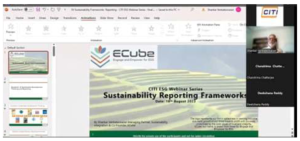 Observations were made by industry representatives like TRIBURG, NEW TIMES GROUP, wherein NEW TIMES GROUP highlighted the concerns of the users specifically with regard to the plethora of requirements and the cost requirements as there is still no clarity on how the cost has to be shared between the buyers and the users. Triburg, as a facilitator to several exporting unit also highlighted the challenges they observed of the suppliers.
Observations were made by industry representatives like TRIBURG, NEW TIMES GROUP, wherein NEW TIMES GROUP highlighted the concerns of the users specifically with regard to the plethora of requirements and the cost requirements as there is still no clarity on how the cost has to be shared between the buyers and the users. Triburg, as a facilitator to several exporting unit also highlighted the challenges they observed of the suppliers.
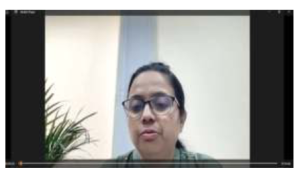
CITI will continue to hold these workshops to dive deeper into the various aspects of sustainability ESG requirements and reporting frameworks with the objective of capacity building of the Textile and Apparel industry, especially the MSME sector.
CITI invite suggestions from the industry on the areas they need further discussions on.
